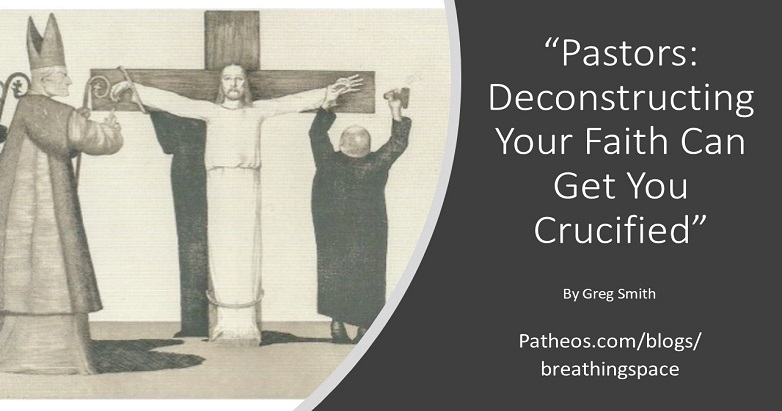Pastors just want to be like Jesus. And just like him, deconstructing your faith can get you crucified.

During Holy Week, you might be thinking about your own religious deconstruction. Doctrines and practices you once accepted as inspired no longer bear the fingerprint of God. You’ve been rethinking and praying through what you really believe, and how different that might be from what your congregants expect you to teach. You’re not alone. Without his own deconstruction experience, Jesus would never have gone to the cross. Like Jesus, your own recentering just might get you crucified.
Here’s how the events of Holy Week become a template for deconstruction getting you lynched:
Palm Sunday—Rocking the Religiopolitical Landscape
Jesus’ triumphal entry into Jerusalem rocked everybody’s world, religiously and politically. You’ve probably preached that Palm Sunday is about Jesus rejecting empire. This made Jesus unpopular with the Romans, who demanded loyalty to Caesar. It also angered the Zealots who wanted the Romans out and a Jewish king in. On Palm Sunday, Jesus pantomimed the idea of empire while refusing to participate in its violence or inequities. For Jesus to arrive at this point of understanding could only be the result of a major deconstruction of his religiopolitical world and the people’s messianic expectations.
Perhaps your spiritual deconstruction has caused a shift in your politics as well. You’ve become a social or political liberal who’s serving a conservative congregation. Or maybe the opposite. If your leanings don’t match up with the majority of your parishioners, they’ll eventually catch on—no matter how tactfully you dodge their political questions. Because your politics affect your theology, and vice versa. And pretty soon, it’ll come out in your preaching. Once the people figure it out, just like Jesus, you might just get crucified.
Monday – Jesus Clears the Temple
All his life, Jesus walked past the money changers and vendors in the temple. But on this particular day, he couldn’t let it go. Whether it was a premeditated demonstration or an impromptu action, Jesus took this opportunity to say, “Enough is enough.” He was raised to accept the marriage of capitalism and worship, but at some point, he reevaluated this belief. Perhaps it was when he realized it blocked people from entering the sanctuary and marginalized those who couldn’t afford the better offerings. His deconstruction precipitated extreme action that eventually led to the populace rejecting him and demanding his crucifixion.
If your faith shift has removed the blinders so that you can see the “money changers and vendors” at church for what they are, this could lead to your own “temple tantrum.” You might decide to put a stop to all the shenanigans, just like Jesus. But your unpopular stance could disempower the elite in your congregation and elevate the ostracized. Worse yet, it might reinstate spirituality as the purpose of worshipful gathering, disenfranchising those who make it about prestige or profit. Your “enough is enough” might be just as welcome as Jesus turning out the money changers—and it could lead to your hanging.
Tuesday – Calling Out the Hypocrites
Jesus’ divergence from religion as usual caused him to see the leaders for what they were. He accused them of heaping heavy burdens of righteousness on people, without lifting a finger to assist. He said they demand places of honor for themselves, while disqualifying others from the realm of Heaven. They cross land and sea to proselytize, but the religion they impart simply turns their converts into worse sinners than themselves. Jesus called these leaders “blind guides,” and “whitewashed tombs.” If Jesus had never distinguished the religion of his fellows from the truth he intuitively knew, he would have stayed out of trouble and never called out the hypocrites.
Maybe you entered ministry as an idealistic Evangelical, but through deconstruction you’ve come to understand the nature of spiritual abuse. You’ve seen the damage of doctrines that tell people they’re inherently evil, and damn them for being imperfect. You’ve watched as misogynists deny women the right of full participation and leadership. You’ve seen and opposed the Evangelical church’s resistance to queer dignity and rights. There’s nothing like deconstruction to make you impatient with hypocrisy—and if you’re anything like Jesus you’ll have something to say about it. Watch out—you might just get strung up, either by your congregants or those in authority over you.
A Hill to Die On
The hard part of ministry is choosing your battles, and deciding which issues are a hill to die on. Every pastor has to decide what’s right for them. At the beginning, I argued with my choir director about half the songs they chose, because they didn’t fit my theology. Soon I learned that in my setting, choir anthems were not a hill to die on. Then there was the prominence of the American flag in worship. Again, in the area where I served, this was not a fight I could survive. It might be a different matter for you. Only you can decide whether this is going to be your Calvary.
For me, issues of human rights and equity were tables that needed to be overturned, even if it meant crucifixion. Often while serving conservative churches, I took the opportunity to speak out for racial justice, LGBTQIA+ rights, and other matters of social justice. I paid for it with deacons getting up and walking out of church during sermons, with members withholding their offerings, and with declining attendance. Thankfully, I never lost a job over it. Not every progressive pastor in a conservative church is as fortunate.
The values I learned through my process of deconstruction caused me to question every point of theology, spiritual practice, and church tradition. I had to decide which social issues would be my Calvary, and which poor teachings I could more subtly subvert. Deconstruction will cause many concerns—but not every one is your hill to die on. Though his theology was dubious due to its connection to penal substitutionary atonement, I appreciated the advice of one old minister who warned me, “Jesus got crucified so you wouldn’t have to.” On the other hand, Jesus did say, “Take up your cross and follow me.” Balancing those two truths is the challenge. So, choose wisely when you have tables to overturn and nasty names to call church leaders. Not every issue is your Golgotha. But when you find one that is—make sure that it counts.
Next time—“Pastors: If Your Deconstruction Gets You Crucified, There’s Hope of Resurrection”
If you like what you’re reading, sign up for my newsletter—and don’t forget to leave a comment.












